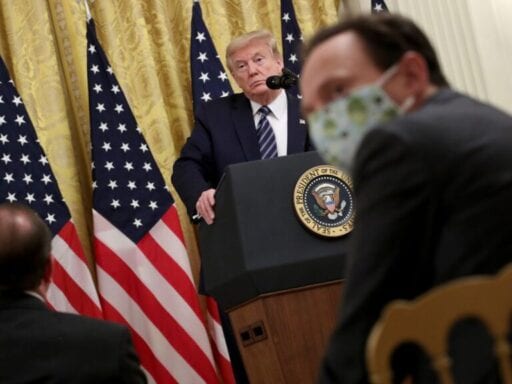It’s not as trivial as it sounds.
On each of the last four days, President Donald Trump has lamented that the coronavirus pandemic is the worst the world has seen since 1917. There’s just one problem — the flu pandemic he’s referring to actually began in 1918.
This may seem like a little thing, and in a universe of Trump falsehood featuring claims about much more consequential matters such as climate change and voter fraud, it is. But since the lessons from how governments handled the 1918 pandemic that are relevant to the coronavirus, Trump’s ignorance, in this case, has a significance beyond illustrating a shaky grasp of details — that some of his falsehoods are utterly impervious to correction.
“Who would think you could have a stock market at 24,000 after we’ve gone through the worst pandemic since 1917? That’s over 100 years,” Trump said on Wednesday, adding Thursday: “Tremendous death. It was just a terrible thing, the likes of which we haven’t seen I guess if you go back over 100 years, 1917. And that was a terrible thing.”
Trump still hasn’t figured out that the 1918 flu pandemic didn’t happen in 1917 pic.twitter.com/7FQGlT9O9Z
— Aaron Rupar (@atrupar) April 30, 2020
This didn’t just start this week. Trump has been regularly claiming that the 1918 flu pandemic started in 1917 since he started holding coronavirus-related press briefings in March.
“Nobody’s seen this I would say since 1917, which was the greatest of them all, the greatest of this type of battle,” Trump said on April 4. “Right? 1917.”
Trump keeps saying that the 1918 flu pandemic happened in 1917, which is wrong pic.twitter.com/7o4zNAEWnC
— Aaron Rupar (@atrupar) April 4, 2020
According to a tally compiled by Susan Glasser of the New Yorker, Trump has incorrectly referred to a 1917 flu pandemic at least 27 times since March 11. As she noted:
In a handful of instances—six, by my count—Trump referred to both 1917 and 1918, suggesting that someone had perhaps tried to give him the correct date, but he could never quite get it to stick.
The ironic thing is that if anybody should be able to get the date right, it should be Trump. His grandfather, Friedrich Trump, died in New York City in 1918 from the flu during the early stages of a pandemic that killed about 675,000 Americans. Nonetheless, Trump, seemingly unaware of his family’s history, said in March, “Does anybody die from the flu? I didn’t know people died from the flu.”
“I told the pharmaceutical companies that they have to do a better job on that vaccine” — Trump admits he just learned that the flu can be deadly and says he wants the pharmaceutical companies to do something about it pic.twitter.com/7jPDsi7WAX
— Aaron Rupar (@atrupar) March 3, 2020
Given that he makes the same false claim just about every day (and, as was the case on Wednesday, more than once a day), you’d think one of Trump’s advisers would try to correct him. Maybe they have and it just hasn’t stuck. Whatever the case, Trump just can’t seem to get it right.
Trump has a notoriously shaky grasp of history. Recall, for instance, how during one of his first public events as president he described Frederick Douglass, who died in 1895, as “an example of somebody who’s done an amazing job that is being recognized more and more, I notice,” or how he regularly expresses surprise more people aren’t aware that Abraham Lincoln was a Republican.
While it could be argued that these gaffes are trivial, the 1918 pandemic actually offers some important lessons for governments struggling to handle the coronavirus.
As my colleague German Lopez has detailed, perhaps the most important lesson is that moving away from social distancing too soon is a grave mistake.
“Studies show that the social distancing efforts helped slow the spread of the 1918 flu and reduce the mortality rate overall,” Lopez wrote. “In city after city during the 1918 flu pandemic, giving up on such measures early consistently caused flu cases and deaths to rise again.”
But even as the daily number of new, confirmed cases in the US in April plateaued instead of declined, Trump is pushing for businesses and schools to reopen.
“I think what happens is it’s going to go away,” Trump said of the coronavirus on Wednesday, even though studies about the 1918 pandemic indicate that if he has his way and businesses reopen before the virus is under control, cases will spike.
As George Santayana once wrote, “Those who cannot remember the past are condemned to repeat it.”
Support Vox’s explanatory journalism
Every day at Vox, we aim to answer your most important questions and provide you, and our audience around the world, with information that has the power to save lives. Our mission has never been more vital than it is in this moment: to empower you through understanding. Vox’s work is reaching more people than ever, but our distinctive brand of explanatory journalism takes resources — particularly during a pandemic and an economic downturn. Your financial contribution will not constitute a donation, but it will enable our staff to continue to offer free articles, videos, and podcasts at the quality and volume that this moment requires. Please consider making a contribution to Vox today.
Author: Aaron Rupar
Read More



